英语专四语法重点解释
- 格式:doc
- 大小:124.50 KB
- 文档页数:15
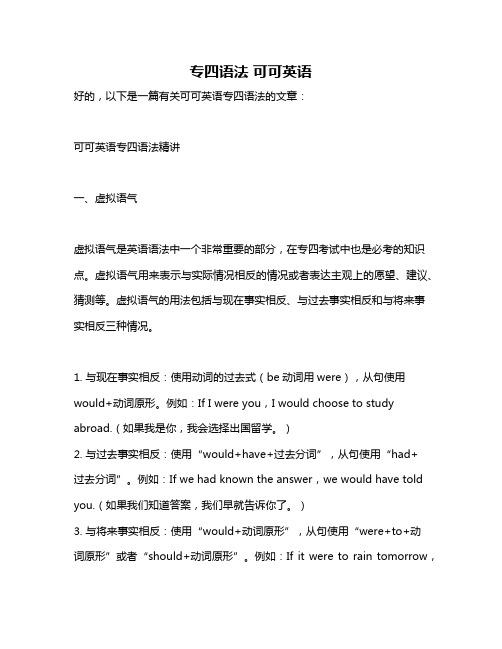
专四语法可可英语好的,以下是一篇有关可可英语专四语法的文章:可可英语专四语法精讲一、虚拟语气虚拟语气是英语语法中一个非常重要的部分,在专四考试中也是必考的知识点。
虚拟语气用来表示与实际情况相反的情况或者表达主观上的愿望、建议、猜测等。
虚拟语气的用法包括与现在事实相反、与过去事实相反和与将来事实相反三种情况。
1. 与现在事实相反:使用动词的过去式(be动词用were),从句使用would+动词原形。
例如:If I were you,I would choose to study abroad.(如果我是你,我会选择出国留学。
)2. 与过去事实相反:使用“would+have+过去分词”,从句使用“had+过去分词”。
例如:If we had known the answer,we would have told you.(如果我们知道答案,我们早就告诉你了。
)3. 与将来事实相反:使用“would+动词原形”,从句使用“were+to+动词原形”或者“should+动词原形”。
例如:If it were to rain tomorrow,the football match would be postponed.(如果明天下雨,足球比赛就会被推迟。
)二、定语从句定语从句是英语语法中的另一个重要知识点,也是专四考试的重点。
定语从句用来修饰名词,通常放在所修饰名词之后。
引导定语从句的关联词包括that、which、who、whose等。
1. 使用that的情况:当先行词为all、something、nothing、this等不定代词时,或者先行词被形容词最高级修饰时,多用that引导定语从句。
例如:This is the most interesting book that I have ever read.(这是我读过的最有趣的书。
)2. 使用which的情况:当引导词前面有逗号或放在句末时,通常使用which。
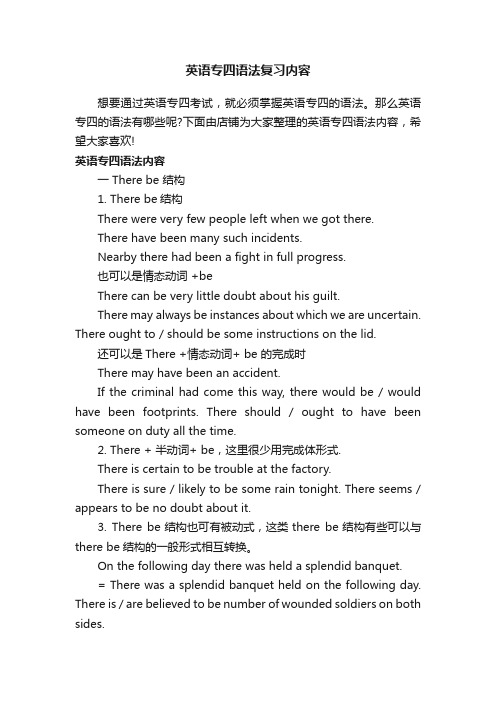
英语专四语法复习内容想要通过英语专四考试,就必须掌握英语专四的语法。
那么英语专四的语法有哪些呢?下面由店铺为大家整理的英语专四语法内容,希望大家喜欢!英语专四语法内容一 There be 结构1. There be结构There were very few people left when we got there.There have been many such incidents.Nearby there had been a fight in full progress.也可以是情态动词 +beThere can be very little doubt about his guilt.There may always be instances about which we are uncertain. There ought to / should be some instructions on the lid.还可以是There +情态动词+ be 的完成时There may have been an accident.If the criminal had come this way, there would be / would have been footprints. There should / ought to have been someone on duty all the time.2. There + 半动词+ be,这里很少用完成体形式.There is certain to be trouble at the factory.There is sure / likely to be some rain tonight. There seems / appears to be no doubt about it.3. There be结构也可有被动式,这类there be结构有些可以与there be结构的一般形式相互转换。
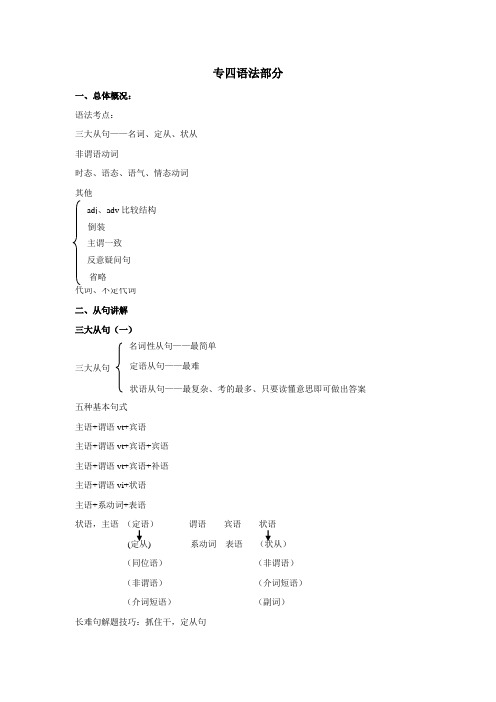
专四语法部分一、总体概况:语法考点:三大从句——名词、定从、状从非谓语动词时态、语态、语气、情态动词其他二、从句讲解三大从句(一)三大从句五种基本句式主语+谓语vt+宾语主语+谓语vt+宾语+宾语主语+谓语vt+宾语+补语主语+谓语vi+状语主语+系动词+表语状语,主语(定语)谓语宾语状语(定从) 系动词表语(状从)(同位语)(非谓语)(非谓语)(介词短语)(介词短语)(副词)长难句解题技巧:抓住干,定从句逗号原则:在英语句子中,逗号是不能连接两个独立完整的句子的。
名词性从句三大从句(二)两步解题法1.抓连词2.状从中的连接词——常考固搭so…that in order that such…that with the result that so thatthat引导名词性从句——that+完整句子(1)主语从句e.g. It is true that he passed the exam.It is said that he passed the exam.It is a pity that he didn’t pass the exam.强调句式It is/was+被强调部分+that+不完整句子主、宾、表、状e.g. I met him in the street.It was him that I met in the street.It was in the street that I met him.(2)宾语从句主+谓语vt+(that)+完整句子e.g. I know (that) he passed the exam.(3)表语从句主+系动词+that+完整句子e.g. My suggestion is that he go with us tomorrow.(4)同位语从句抽象名词+that+完整句子e.g. My suggestion that he go with us tomorrow.There is/are +抽象名词+that+完整句子Answer,belief,concept,conclusion,decision,discovery,doubt,evidence,sign,fact,hope,idea,informati on,knowledge,suggestion,thought,probability…On the condition that…Despite the fact that…On the understanding that…that 引导限定性定从all some any one(s) every each…the first the lastthe only the veryn+that+不完整句子作从句中的主、宾、表语e.g. The book that was written by him is pop.that引导同位语从句抽象名词+that+完整句子that 引导限定性定从n+that+不完整句子作从句中的主、宾、表语The fact that he passed the exam was true.The fact that he found was true.三大从句(三)What=all that; the thing that; the person thatWhat 只引导主从、宾从、表从,不能引导定从和同位从What+不完整句子What he said made me happy.e.g. _____it turned out,it was Italian movie.A What_____it turned out was Italian movie.A WhatI know what he said.I listen to what he said.This is what he said.词______+ 不完整句子n A what Xvt/介词/系动词 A what 可以考虑词,_______+不完整句子A whatB whichC thatwhat 与how 的区别I don’t know what to do.I don’t know how to do it.I’m thinking of ______to do about it.A.whatB. how介词短语在句子的位置1)作状语句子+介短/介短+句子2)作定语n+介短3)作表语系+介短wh—ever与no matter wh—区别让步、名从让步I don’t believe whatever he said.Whatever happens,don’t panic.公式however + adj/adv + 主语+ 谓语e.g. It caused them to think about _______they might control the experiences of children to duce responsible and productive adults.A. whatB. howC. whateverD. however if 与 whether 的区别 if_______about the university the mind, love, dreams, or ordering a drink. A) whatB) whether C) while D) if Never ask a child _______he likes or dislikes.A) what B) whether C) that D) which We know, however,________ no two places are exactly the same. A) Although B) whether C) since D) that 三大从句(四) 定语从句两步解题法1. 抓先行项(指人、物、整句话内容)2. 抓关系词在定语从句中的成分e.g. This is the house_______①I once lived.②I once visited.①where/in which②that/which/xThis is the very house_________ I once visited.e.g. I’ll never forget the day______①I met him.②I spent with him.①when/on which②that/which/xI’ll never forget the very day______ I spent with him. 地点n where 主+谓vt+宾/宾/宾补主+谓vi主+系+表时间n when 主+谓vt+宾/宾/宾补主+谓vi 主+系+表the reason why 主+谓vt+宾/宾/宾补 主+谓vi 主+系+表 三大从句(五)Which 在专四考试中,只考定语从句。
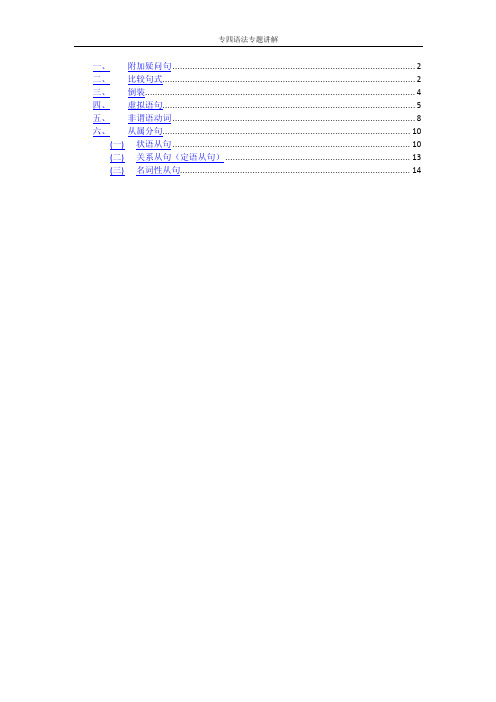
一、附加疑问句 (2)二、比较句式 (2)三、倒装 (4)四、虚拟语句 (5)五、非谓语动词 (8)六、从属分句 (10)(一)状语从句 (10)(二)关系从句(定语从句) (13)(三)名词性从句 (14)一、附加疑问句附加疑问句由两部分组成,前面是一个陈述句,后面是一个简短问句,下面分析几种特殊的附加疑问句形式:1. 如果陈述部分是祈使句,附加疑问句部分一般使用will you, w on’t you例如:Pass me some salt, won’t you?递给我一些盐,好吗?2. 如果陈述部分的主语是this, that, these, those时,附加疑问句部分的主语为it或they例如:This is exciting, isn’t it?这很令人兴奋,不是吗?3. 如果陈述部分是一个复合句,则分两种情况:1) 一般情况下,附加疑问句部分的主语应与陈述部分的主语保持一致,例如:Mary said her son would come, didn’t she? 玛丽说她的儿子要来,不是吗?2) 但如果陈述部分的主语是第一人称,且谓语动词是suppose, think, believe等,附加疑问句的主语则应该与从句的主语保持一致,例如:I think he will come, won’t he?我认为他会来,不是吗?4. 如果陈述部分是there be存在句,附加疑问句部分的主语也应该用there例如:There are some books, aren’t there?有一些书,不是吗?5. 如果陈述部分中带有否定词或半否定词,如never,hardly,scarcely,seldom,no,none,no one,rarely,nowhere,nothing,nobody,few,little等,附加疑问句的谓语要用肯定形式例如:There are rarely extremes of cold or heat in Britain, are there?英国很少出现严寒或酷暑天气,是吗?二、比较句式1. 形容词、副词比较级和最高级的用法1) 比较级修饰语(a) 比较级之前的副词修饰语常用many, much, far, a little, a bit, slightly, a great deal, a lot, somewhat, rather, etc.。

TEM 4重点语法详解1. 集体名词作主语主谓一致1)通常作复数的集体名词集体名词,如:police, people, cattle, militia, poultry 等,通常作复数,用复数动词。
如:Domestic cattle provide us with milk, beef and hides.2)通常作不可数名词的集体名词有些集体名词,女口f oliage, machinery, equipment, furniture, merchandise, 通常作不可数名词,随后的动词用单数。
例如:All the machi nery in the factory is made in Ch ina.3)既可作单数也可作复数的集体名词集体名词,女口audienee, committee, class, crew, family, public, government 等,既可作单数,可作复数用。
The city council is meeti ng to set its age nda.4) a committee, etc. of + 数纟如果主语是由"a committee of /a panel of /a board of +复数名词”构成,随后的动词通常用单数。
例如: A committee of five men and three wome n is to con sider the matter.2. 关于used to的意义和用法used to (只有过去时形式,没有现在时形式)表示过去习惯动作或状态,这种情况现已不复存在。
例如:He used to smoke a lot, but he has long give n up smok ing.在否定陈述句或否定疑问句中,用didn' t use to或usedn' t to均可:He didn ' t use to smoke cigarettes.He usedn' t to smoke cigarettes.Didn ' t Maria use to be interested in the theatre?Usedn' t Maria to be interested in the theatre?在肯定疑问句中也可有两种形式:Used you to go to the same school as Edward?Did you use to go to the same school as Edward?3. 关于dare的意义和用法作为情态动词表示“胆敢”,dare通常只用于否定陈述句和疑问句。
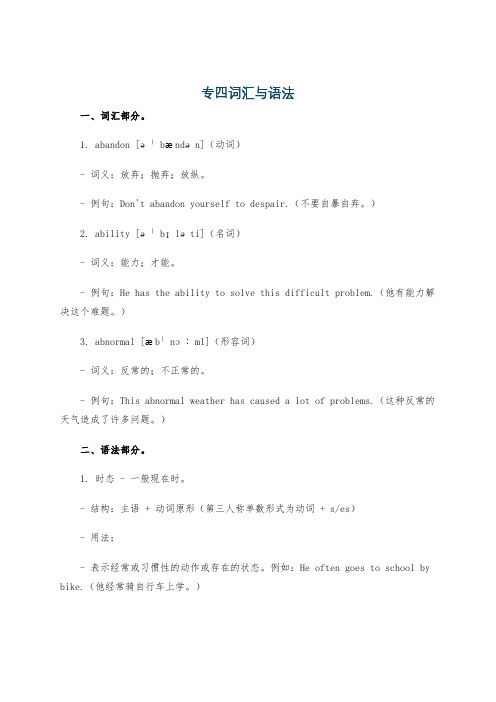
专四词汇与语法一、词汇部分。
1. abandon [əˈbændən](动词)- 词义:放弃;抛弃;放纵。
- 例句:Don't abandon yourself to despair.(不要自暴自弃。
)2. ability [əˈbɪləti](名词)- 词义:能力;才能。
- 例句:He has the ability to solve this difficult problem.(他有能力解决这个难题。
)3. abnormal [æbˈnɔːml](形容词)- 词义:反常的;不正常的。
- 例句:This abnormal weather has caused a lot of problems.(这种反常的天气造成了许多问题。
)二、语法部分。
1. 时态 - 一般现在时。
- 结构:主语 + 动词原形(第三人称单数形式为动词 + s/es)- 用法:- 表示经常或习惯性的动作或存在的状态。
例如:He often goes to school by bike.(他经常骑自行车上学。
)- 表示客观事实或普遍真理。
例如:The earth moves around the sun.(地球绕着太阳转。
)2. 名词的数 - 可数名词复数形式。
- 规则变化:- 一般情况加 -s,如book - books。
- 以s, x, ch, sh结尾的加 -es,如box - boxes。
- 以辅音字母 + y结尾的,变y为i加 -es,如city - cities。
- 不规则变化:- 如man - men,woman - women,child - children等。
3. 形容词和副词的比较级和最高级。
- 规则变化:- 单音节词和部分双音节词:- 一般情况加 -er(比较级)和 -est(最高级),如tall - taller - tallest。
- 以e结尾的加 -r和 -st,如nice - nicer - nicest。
语法考点之一:虚拟语气考点1. If从句中的虚拟语气1、与过去事实相反:从句sb had done,主句sb would(should, could, might)+ have done;2、省略if,从句的语序用到装,即将were, had或should移至主语的前面,但否定词not不前移。
3、与将来事实相反:从句sb did (should+do或were+to do),主句sb would (should, could, might)+do。
4、错综条件句:主句与从句的动作发生在不同的时间段。
比如:从句对过去虚拟,而主句对现在虚拟,即从句sb had done,主句sb would(should, could, might)+do;考点2:表示建议、要求、命令等动词如insist, order, command, suggest, advise, propose, ask, require, request, demand引导的从句及it引导的相应的分词、名词和形容词从句,谓语用(should)+动词原形。
考点3:It is +advisable, essential, important, imperative, incredible等从句,谓语用(should)+动词原形。
考点4:it is (high/about) time that的结构中,从句使用一般过去式。
例如:考点5:much as"尽管,虽然"引导让步状语从句,从句中用would have done表示假设。
考点6:if only, wish, as if/as though引导从句,与过去事实相反:had + done;与现在事实相反:动词过去式;与将来事实相反:could/would + do考点7:would rather/sooner从句中使用一般过去式或过去完成式分别表示对现在或过去的虚拟考点8:lest / for fear that+(should ) +原形动词。
专业四级英语考试辅导–语法时态55. The student said there were a few points in the essay he _______ impossible tocomprehend.A. has foundB. was findingC. had foundD. would find(2007年试题)间接引语中时态的一致59. The student said there were a few points in the essay he _______ impossible tocomprehend.A. had foundB. findsC. has foundD. would find(2005年试题)55. Linda was ______ the experiment a month ago, but she changed her mind at thelast minute.A. to startB. to have startedC. to be startingD. to have been startingto be to do = to be going to was to do something 过去的计划to be to have done 计划了,未做was to have done…计划了,未做57. I went there in 1984, and that was the only occasion when I ____ the journey inexactly two days.A. must makeB. must have madeC. was able to makeD. could make could = ability be able to do = reality52. Jack ____ from home for two days now, and I am beginning to worry abouthis safety.A. has been missingB. has been missedC. had been missingD. was missedmissing = 丢失lost missed = 错过54. James has just arrived, but I didn't know he ____ until yesterday.A. will comeB. was comingC. had been comingD. camehas just arrived 说明yesterday 是处于be coming 的状态。
55. ______ conscious of my moral obligations as a citizen.A. I was and always will beB. I have to be and always will beC. I had been and always will beD. I have been and always will be过去_现在_与__将来____ _____ 断______ 开始_________have been 与will be是相连的时间。
was will have to be/will58. The Minister of Finance is believed ______ of imposing new taxes to raise extrarevenue.A. that he is thinkingB. to be thinkingC. that he is to thinkD. to thinkto be believed to do (据信要干什么)to be believed to have done (据信干了什么)to be known to have doneto think of something 想到什么to be thinking of doing 考虑什么,打算干什么58. The committee has anticipated the problems that ______ in the road constructionproject.A. ariseB. will ariseC. aroseD. have arisenanticipated 预见未来工程中的问题,没有开工中的问题用将来时。
43. For some time now, world leaders _______ out the necessity for agreement on armsreduction.A. had been pointingB. have been pointingC. were pointingD. pointed进行时表示动作持续了一段时间,now决定了现在进行时48. You ______ Jim anything about it. It was none of his business.A. needn’t have toldB. needn’t tellC. mustn’t have toldD. mustn’t tellneedn’t have done 本来不必做而做了52. You ____ Mark anything. It was none of his business.主谓一致60. It is futile to discuss the matter further, because ____ going to agree uponanything today.A. neither you nor I areB. neither you nor me isC. neither you nor I amD. neither me nor you areTen miles is nothing to us.Ten miles are ahead of us.就近原则,即谓语动词的单复形式取决于最靠近它的词语,a) 当there be 句型的主语是一系列事物时,谓语应与最邻近的主语保持一致。
There is a pen, a knife and several books on the desk..There are twenty boy-students and twenty-three girl-students in the class.b)当either…or…与neither…nor,连接两个主语时,谓语动词与最邻近的主语保持一致。
如果句子是由here, there引导,而主语又不止一个时,谓语通常也和最邻近的主语一致。
Either you or she is to go.Here is a pen, a few envelops and some paper for you.afternoon.A. are to leaveB. are leavingC. is leavingD. leavetogether with, as well as 的插入。
42. _______ of the twins was arrested, because I saw both at a party last night.A. NoneB. BothC. NeitherD. All情态动词53. “You ____ borrow my notes provided you take care of them,” I told my friend.A. couldB. shouldC. mustD. canprovided 条件从句= if, 从句中为一般现在时,判定主句也是一般现在时can。
Could也可以用于表示客气的语气,但不用在条件句中。
56. Loudspeakers were fixed in the hall so that everyone ______ an opportunity tohear the speech.A. ought to haveB. must haveC. may haveD. should haveso that 引导的状语从句中,主句是过去时,从句中用过去时might / could /should。
57. I am surprised ______ this city is a dull place to live in.A. that you should thinkB. by what you are thinkingC. that you would thinkD. with what you were thinkingshould do 表示惊讶,奇怪,欢欣等。
It is strange that he should win the game.He was disappointed that she should love a boy three years younger than she. amazing strange odd ridiculous surprising unthinkable在for fear that (以备) / in case ( lest) 后谓语用should + do虚拟语气非真实条件句主句were / had / did would 现在时someone had done would have done过去时Had someone donewere to do would将来时should doWere he to do …Should he do …could have done would have done might have done should have done均用于本应发生而未发生的状况48. He ___ unwisely, but he was at least trying to do something helpful.A. may have actedB. must have actedC. should actD. would act51. If you explained the situation to your solicitor, he _______ able to advise you muchbetter than I can.A. would beB. will have beenC. wasD. were54. ______ if I had arrived yesterday without letting you know beforehand?A. Would you be surprisedB. Were you surprisedC. Had you been surprisedD. Would you have been surprised52. Had Judy been more careful on the maths exam, she ____ much better results now.A. would be gettingB. could have gotC. must getD. would get60. He would have finished his college education, but he ______ to quit and find a jobto support his family.A. had hadB. hasC. hadD. would have54. ______ if I had arrived yesterday without letting you know beforehand?A. Would you be surprisedB. Were you surprisedC. Had you been surprisedD. Would you have been surprised49. All of us would have enjoyed the party much more if there___ quite such a crowdof people there.A. weren’tB. hasn’t beenC. hadn’t beenD. wouldn’t be条件句中的倒装50. _______ for the fact that she broke her leg, she might have passed the exam.A. Had it not beenB. Hadn’t it beenC. Was it notD. Were it not63. ______ you ______ further problems with your printer, contact your dealer foradvice.A. If, hadB. Have, hadC. Should, haveD. In case, hadShould … do, please contact …这是经常用于行政与商务公文中的用语。